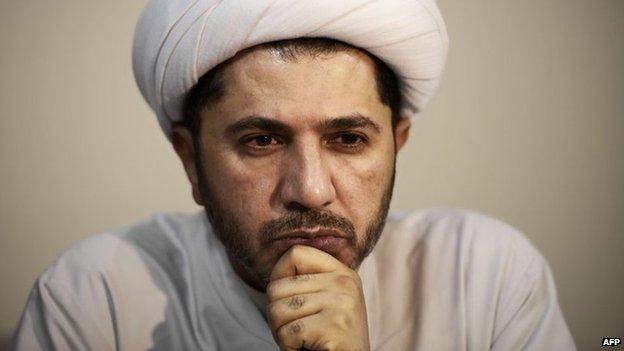Bahrain Shia opposition chief Ali Salman to stand trial
- Published

Sheikh Ali Salman "categorically rejected" the charges, his political grouping said
Bahraini Shia opposition leader Sheikh Ali Salman has been formally charged with "promoting political change using illegal forceful means and threats".
Attorney General Yousef Mahmoud said the head of the Wefaq political society would go on trial next week.
The charges relate to a series of recent statements by Sheikh Salman, who was arrested on 28 December.
His detention has sparked near-daily protests by Wefaq supporters, while the UN, US and EU have expressed concern.
They have warned it could further destabilise the Sunni-ruled Gulf kingdom, which has seen years of unrest since the government's suppression of Shia-led pro-democracy demonstrations in 2011.
A national dialogue process is currently at an impasse, with the opposition accusing the ruling Al Khalifa family of wanting to retain all powers, and angry Shia youth are increasingly turning to violence.
'Unrealistic' charges
on Monday afternoon cited the attorney general as saying the investigation into Sheikh Salman had been formally concluded and that his trial at the Higher Criminal Court would begin on 28 January.
"The defendant was presented with evidence underpinning the charges, including recordings of public speeches that promoted political change, confronting state authorities, calls to stage unlawful protests, in addition to incitement to non-compliance with the law," Mr Mahmoud said.
The Wefaq leader's detention has sparked near-daily protests by opposition supporters
He was accused of issuing calls to his supporters to "deploy military tactics used elsewhere in the region to overthrow the government".
Mr Mahmoud alleged that Sheikh Salman had admitted during questioning to saying in public speeches that the opposition had been offered "military assistance such as the assistance given to members of the Syrian opposition" and also that he had "held meetings when abroad with groups that offered him access to arms".
s against its leader, calling them "unrealistic" and his trial "political".
Sheikh Salman "categorically rejected" the charges and insisted that his statements had been deliberately taken out of context, it added.
"There is no real case and no legal or moral excuse to detain or try [him]."
On Sunday, it had reviewed the speeches used as evidence by prosecutors in the case against Sheikh Salman and could not find any language of direct incitement to violence.
for charges to be dropped against the human rights activist Nabeel Rajab, who is scheduled to stand trial on Tuesday.
Mr Rajab could face up to six years in prison if convicted over a post on Twitter that allegedly "insulted state institutions".